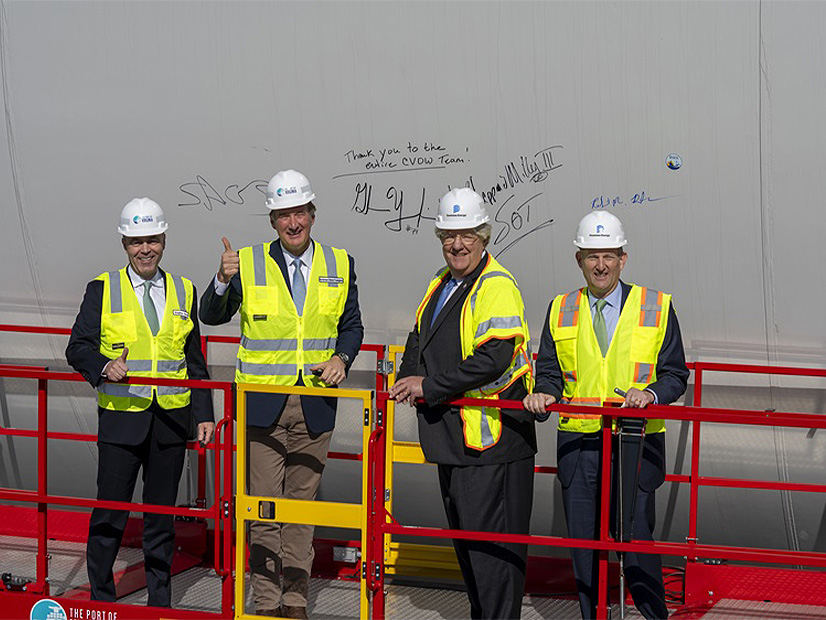
Dominion Energy reported third-quarter earnings Friday, with executives focusing on why its offshore project is successful and on its business review that is nearing completion.
“Our fully regulated offshore wind project is on time and on budget and is expected to save customers more than $3 billion in fuel costs over the first 10 years of operation while creating hundreds of jobs and millions of dollars of local economic benefit,” CEO Robert Blue said.
The Coastal Virginia Offshore Wind (CVOW) project is being built off the coast of Virginia Beach and is planned to have 176 turbines producing a nameplate capacity of 2.6 GW. The wind plant won final approval from federal regulators earlier in the week and saw the delivery of the first monopiles to a nearby port facility in late October. (See BOEM Approves Coastal Virginia Offshore Wind.)
“The next transport ship for monopiles is expected to be loaded at the factory later this month and delivered to the port in December,” Blue said. “Also worth noting is that turbine blades and the cells remain on track with a fixed production schedule and mature existing manufacturing facilities.”
The monopile delivery included a ceremony with politicians from across the spectrum in the commonwealth, with Blue noting the project has “bipartisan support” a few days before an election that could give the Republican Party control over both chambers of the legislature and the governor’s office for the first time in years. The polling in the election shows a very close race.
The project has a priority position in the offshore wind supply chain, and Dominion has proven successful at getting approvals from the required regulators, Blue said.
The firm expects to complete CVOW by the end of 2026, and most of its $9.8 billion in costs already are fixed.
“We updated the project expected [levelized cost of energy] in our filing earlier this week to approximately $77/MWh, as compared to our previous range of $80 to $90,” Blue said. “The decrease reflects updated and refined estimates around production tax credit, cost of capital and [renewable energy credit] values.”
The project’s total lifetime costs are expected to come in well below the ceiling set by the legislature when it approved the development.
Dominion will have invested $3 billion into CVOW by the end of the year, and the rest of the $9.8 billion is 92% fixed, with just the costs of interconnecting the project to the transmission grid, some commodities such as fuel used for construction, and installation and project oversight costs yet to be nailed down, Blue said.
“We’ve been very clear with our team and with our vendors that delivery of an on-budget project is the expectation,” he added.
Dominion has been in talks with counterparties to sell a minority share in CVOW to help raise the remaining equity. Blue said those talks have generated much interest.
“It’s in the long-term best interest of our customers and shareholders that we make the right, not just the expedient, decision,” Blue said. “A properly structured partnership with the optimal counterparty is an attractive option. But only if the terms of a potential transaction make sense for our customers and shareholders.”
A decision picking a counterparty for the wind project is the last part of Dominion’s ongoing business review, which has seen it sell its share of the Cove Point LNG project and exit the natural gas utility business, Blue said. The firm expects to make a choice in the next few months.
The review was launched after investors expressed worries about the firm’s earnings, the Virginia regulatory model (which was revised early this year) and its balance sheet, Blue said.
“The review must comprehensively and finally address the foundational concerns that have eroded investor confidence over the last several years,” Blue said. “This can’t be a series of partial solutions that leave key elements and risks unaddressed. That’s how we’ve approached this top-to-bottom review.”



